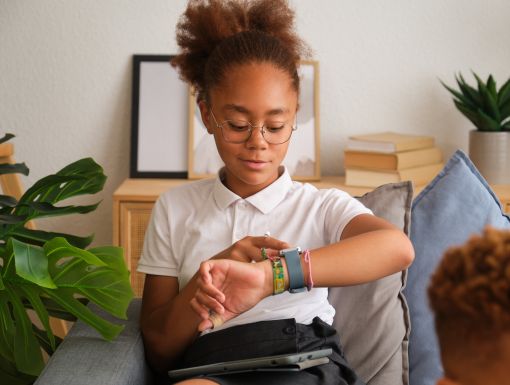
Screen Time for Kids: 4 Things Parents Should Do
Over the past six years, the average screen time for kids up to age 8 has jumped from just five minutes to 48 minutes a day. Almost every home — 98% — with young children has at least one smartphone or tablet. While these devices can be great tools, too much screen time can cause problems for kids’ health, development and relationships.
Why does screen time matter for children?
Phones, tablets and other gadgets are everywhere, making them hard to avoid. Many parents wonder how much screen time is too much and whether it’s affecting their kids. Some researchers are studying whether screen time can even become an addiction. Many apps, games, and videos are designed to keep kids (and adults!) online longer, which can make it hard to set limits.
At the same time, technology isn’t all bad. It helps kids learn, connect, and explore. The goal is to find a balance between healthy use and overuse.
What are signs of unhealthy screen time use in children?
For some kids, screen time becomes a problem. Look out for signs like:
- Using devices to escape feelings or problems
- Lying about how much time they spend online or on screens
- Losing interest in other hobbies
- Becoming irritable or anxious when they can’t have their devices
- Choosing virtual interactions over real-life friendships
Too much screen time can also lead to physical problems, like obesity, because kids spend less time being active. Studies show heavy screen use is linked to a 43% higher risk of obesity. Social and emotional skills may also suffer, making it harder for kids to connect with others or solve problems.
What can parents do about screen time?
- Set the example. Kids learn from watching their parents. If you’re glued to your phone, they’ll think that’s normal. Show them how to take breaks from screens, put your phone away during meals, and be fully present when spending time together.
- Go outside. Spending time in nature is one of the best ways to disconnect and recharge. Take family walks, go camping, or just sit in a park together. Being outdoors helps kids develop focus and creativity, and it’s a break from the constant buzz of technology.
- Encourage independence. Give your kids opportunities to make decisions and solve problems on their own. This builds confidence and reduces the temptation to escape into a screen. Let them help plan a family outing, cook a meal, or explore a new hobby.
- Find your tech-free tribe. Build a community of friends and family who also value limits on screen time. When your kids see others enjoying life without constant devices, it reinforces the idea that it’s OK -- and even fun -- to unplug.
3 rules for healthy screen time
Here are some additional tips to keep screen time in check:
- Use screens to learn and create. Technology can be a tool for discovery and creativity. Encourage your kids to make art, learn new skills, or explore their interests online instead of just scrolling or watching passively.
- Not too much. Set boundaries around screen time. Avoid screens before bed, during meals, or as a reward. Make sure kids spend plenty of time being active and social in the real world.
- Mostly together. Share screen experiences with your kids. Watch or play alongside them and talk about what they’re doing. This helps them process what they see and connect it to the real world.
The bottom line
Technology is here to stay, and it can be a wonderful tool when used wisely. By setting good examples, spending time in nature, encouraging independence, and creating a supportive community, parents can help kids navigate the digital world in a healthy way. Finding balance takes effort, but it’s worth it to help your kids grow up happy, confident, and connected to the real world.
Learn more about Heather Kindschy, LCSW


